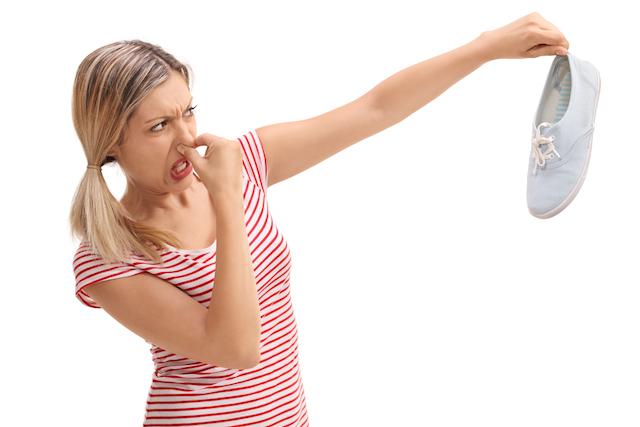Foot odor or unpleasant body smell during pregnancy is a type of body odor that affects the feet but also other body parts of pregnant women and is generally considered to be an unpleasant smell. The medical terminology of bad body smell is "Bromhidrosis" which is also known as "Osmidrosis, bromidrosis or body odor" while smelly feet are known as "bromodosis". In rare cases, bromhidrosis may become a big problem if it is particularly overpowering or if the bromhidrosis significantly interferes with the lives of the affected individuals. Bromhidrosis and bromodosis can be chronic conditions in which excessive odor, usually an unpleasant one, emanates from the skin.
Causes of foot odor during pregnancy
The main cause is foot sweat but sweating can also be increased all over the body (hyperhidrosis). Sweat itself is odorless, but it creates a beneficial environment for certain bacteria to grow and produce bad-smelling substances. These bacteria are naturally present on our skin as part of the human flora (though exponentially more smell is created when closed-toe shoes are worn). The front part of the foot is where it produces the most sweat. Therefore, more smell is created with factors causing more sweating, such as wearing closed-toe shoes for many hours. Socks generally do not cause foot odor on their own, but when worn along with shoes, socks can help to trap the hair on the feet, especially on the toes, and may contribute to the odor's intensity by adding an increased surface area in which the bacteria can thrive
During pregnancy, an increase in fluid retention can cause shoes to fit tighter than normal. When shoes are tight, feet cannot breathe. Air must be able to access the feet on a regular basis in order to keep foot odor to a minimum. Natural bacteria present on the feet typically have no smell – as long as feet stay dry. When feet remain damp for extended periods, foot odor can be a problem.
Pregnant women have an increased risk of foot odor due to the swelling and spreading of the feet caused by pregnancy hormones. Instead of trying to wedge pregnant feet into tight-fitting shoes, it is better to buy a wider shoe to accommodate pregnancy foot sprawl. Wearing moisture-wicking socks can also prevent accumulation of moisture that can lead to foot odor.
Natural baby powder can help by absorbing extra sweat around the feet. After each use, old baby powder should be cleaned out of shoes with a vacuum cleaner. Spraying shoes with an antiseptic household spray like Lysol may also help prevent odors from hanging around shoes.
Is hyperhidrosis the cause of the bad smell during pregnancy?
Hyperhidrosis is a pathological condition of too much perspiration due to excessive secretion by the eccrine sweat glands in amounts greater than required for physiological needs. This can happen anywhere on the body, hands, underarms, and feet
Patients suffering from primary hyperhidrosis usually complain of excessive moisture on the socks or within the shoes; moisture or damage to their clothing due to chemicals combined with the sweat; and offensive smell or odor. The increased moisture on the skin results in an increased incidence of contact dermatitis, blistering, and dermatophyte, bacterial and viral infections.
How to remove/prevent foot smell during pregnancy
Foot odor often comes from the smell that does facilitate the growth of bacteria that release foul-smelling gasses. Wearing shoes makes often the bad odors worse because the moisture inside shoes provides an ideal environment for bacteria to grow. In shoes, your feet are enclosed, warm and damp. Your body’s dead skin cells, which the germs love to feed on, are trapped in one place.
- To battle the foot smell, wash your feet regularly with anti-bacterial soap.
- Exfoliate your feet and especially the bottom regularly.
- Wear regularly fresh clean socks that are made from natural cotton. You may even want to change them more frequently.
- After you wear your shoes, spray them with an antibacterial agent or use powder and keep your shoes in a dry, open space.
- Cleansing of shoes and spraying shoes with antiseptic.
- Using aromatic deodorants that neutralize the odor by their own smell, or by absorbers of the odor itself.
- Among the earliest foot deodorants were aromatic herbs such as allspice, which 19th-century Russian soldiers would put in their boots.
- Odor absorbers include activated charcoal foot insert wafers.
- Methenamine based antiperspirants proved to have positive results in fighting foot odor.
- The Ancient Romans thought that as a remedy against the bad smell, feet should be washed with urine. Methenamine in the form of cream or spray is successfully used for the treatment of excessive sweating and related to its odor.


